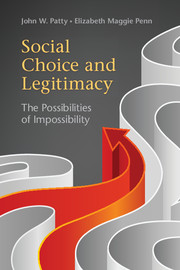2 - The Debates Surrounding Social Choice
Published online by Cambridge University Press: 05 August 2014
Summary
The question of how multiple, competing, goals can be reconciled is the foundation of a branch of political science termed “social choice theory” or “collective choice theory,” the study of which can be traced to the writings of a collection of French mathematicians and philosophers of the late eighteenth century, most notably Jean-Charles de Borda and the Marquis de Condorcet. Condorcet in particular was focused on the search for truth in public discourse, and his most well-known thoughts on politics are found in his Essai sur l'application de l'analyse a la probabilite des decisions rendues a la pluralite des voix (“Essay on the Application of Mathematics to the Theory of Decision-Making”). In this work he proved his famous jury theorem, which says that if a group is choosing between two alternatives (e.g., acquit or convict) and if each individual member of the group is more likely than not to reach a correct decision, then the probability that a majority of the members of the group reach the correct decision is higher than the probability that any individual reaches the correct decision and increases as the size of the group increases. This is a positive result, as it shows that a simple majority vote does well at producing a correct outcome when there are two alternatives and many voters.
- Type
- Chapter
- Information
- Social Choice and LegitimacyThe Possibilities of Impossibility, pp. 12 - 35Publisher: Cambridge University PressPrint publication year: 2014

